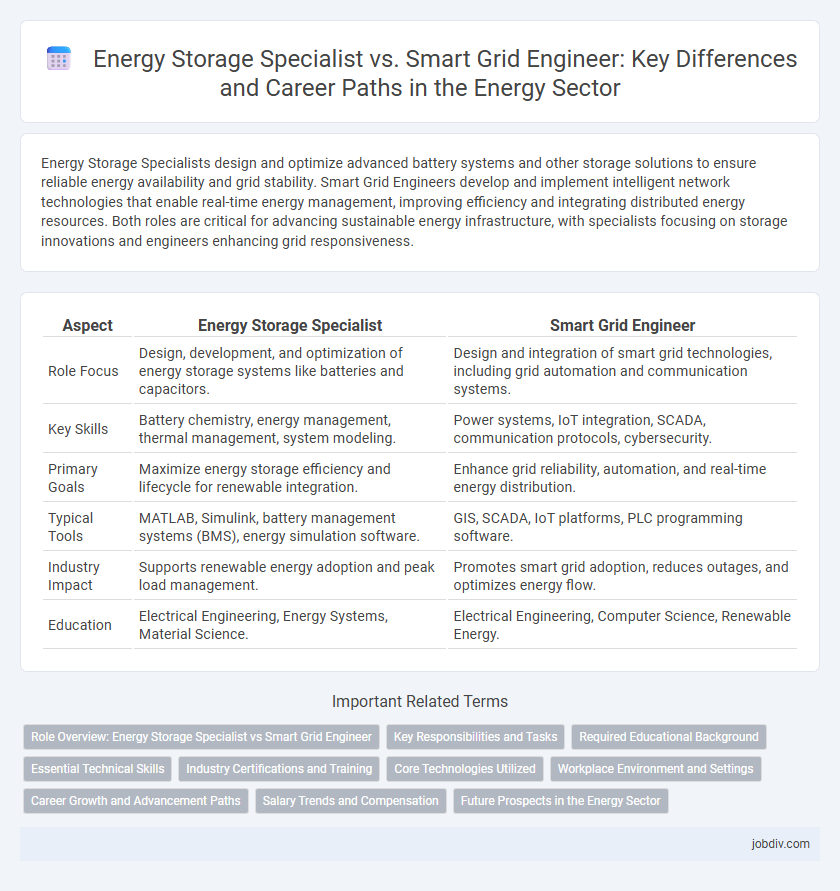Energy Storage Specialists design and optimize advanced battery systems and other storage solutions to ensure reliable energy availability and grid stability. Smart Grid Engineers develop and implement intelligent network technologies that enable real-time energy management, improving efficiency and integrating distributed energy resources. Both roles are critical for advancing sustainable energy infrastructure, with specialists focusing on storage innovations and engineers enhancing grid responsiveness.
Table of Comparison
| Aspect | Energy Storage Specialist | Smart Grid Engineer |
|---|---|---|
| Role Focus | Design, development, and optimization of energy storage systems like batteries and capacitors. | Design and integration of smart grid technologies, including grid automation and communication systems. |
| Key Skills | Battery chemistry, energy management, thermal management, system modeling. | Power systems, IoT integration, SCADA, communication protocols, cybersecurity. |
| Primary Goals | Maximize energy storage efficiency and lifecycle for renewable integration. | Enhance grid reliability, automation, and real-time energy distribution. |
| Typical Tools | MATLAB, Simulink, battery management systems (BMS), energy simulation software. | GIS, SCADA, IoT platforms, PLC programming software. |
| Industry Impact | Supports renewable energy adoption and peak load management. | Promotes smart grid adoption, reduces outages, and optimizes energy flow. |
| Education | Electrical Engineering, Energy Systems, Material Science. | Electrical Engineering, Computer Science, Renewable Energy. |
Role Overview: Energy Storage Specialist vs Smart Grid Engineer
Energy Storage Specialists focus on designing, implementing, and optimizing battery systems and other energy storage technologies to enhance grid reliability and energy efficiency. Smart Grid Engineers develop and maintain advanced grid infrastructure using digital communications, automation, and real-time data analytics to integrate renewable energy sources and improve grid resilience. Both roles require expertise in energy management but differ in technological focus, with specialists targeting storage solutions and engineers advancing grid intelligence.
Key Responsibilities and Tasks
Energy Storage Specialists focus on designing, implementing, and maintaining systems for storing energy, ensuring optimal battery performance and integration with renewable sources. Smart Grid Engineers develop and manage intelligent grid infrastructure, optimizing energy distribution and real-time monitoring to enhance grid reliability and efficiency. Both roles require expertise in energy management systems, but Energy Storage Specialists emphasize storage technologies while Smart Grid Engineers prioritize network communication and control systems.
Required Educational Background
Energy Storage Specialists typically require a strong foundation in electrical engineering, chemical engineering, or materials science, often holding a bachelor's or master's degree in these fields with specialized coursework in battery technology, energy storage systems, and electrochemistry. Smart Grid Engineers generally possess degrees in electrical or power engineering, with an emphasis on power systems, communication networks, and control systems, supported by skills in data analytics, grid automation, and cybersecurity. Both roles benefit from advanced technical training and certifications related to renewable energy technologies and grid modernization.
Essential Technical Skills
Energy Storage Specialists must excel in battery management systems, power electronics, and electrochemical processes to optimize storage solutions. Smart Grid Engineers require expertise in communication networks, grid automation, and data analytics to enhance grid reliability and efficiency. Both roles demand proficiency in system integration and renewable energy technologies to support sustainable energy infrastructure.
Industry Certifications and Training
Energy Storage Specialists often hold certifications such as Certified Energy Manager (CEM) and specialized training in battery technologies, thermal storage, and grid integration. Smart Grid Engineers typically acquire certifications like the IEEE Smart Grid Certification and advanced training in communication protocols, cybersecurity, and grid automation. Both roles require continuous upskilling to meet evolving industry standards and enhance grid reliability and efficiency.
Core Technologies Utilized
Energy Storage Specialists primarily utilize battery management systems, advanced chemistry analysis, and grid-scale energy storage solutions like lithium-ion and flow batteries to optimize power retention. Smart Grid Engineers focus on deploying IoT sensors, advanced metering infrastructure (AMI), and SCADA systems to enhance grid monitoring and automation. Both roles integrate software platforms for real-time data analytics but prioritize different core technologies tailored to storage optimization versus grid intelligence and responsiveness.
Workplace Environment and Settings
Energy Storage Specialists typically work in research labs, manufacturing facilities, and field sites where battery systems and energy storage technologies are developed, tested, and maintained. Smart Grid Engineers operate in control centers, utility companies, and communication hubs, focusing on integrating digital technologies and automation within electricity distribution networks. Both roles demand collaboration across interdisciplinary teams but differ in on-site presence, with Energy Storage Specialists often engaging in hands-on hardware installation and maintenance, while Smart Grid Engineers emphasize software and network system management.
Career Growth and Advancement Paths
Energy Storage Specialists experience career growth by deepening expertise in battery technologies and grid integration, often advancing to project management or R&D leadership roles. Smart Grid Engineers expand their skills in IoT, data analytics, and system optimization, progressing toward senior engineering positions or strategic roles in utility innovation. Both career paths offer strong advancement opportunities but diverge based on specialization in hardware-centric storage solutions versus software-driven grid intelligence.
Salary Trends and Compensation
Energy Storage Specialists typically command higher salaries due to the growing demand for advanced battery technologies and renewable integration, with average annual earnings ranging from $90,000 to $130,000. Smart Grid Engineers earn between $80,000 and $120,000, reflecting the increasing investment in modernizing electrical grids and implementing IoT solutions. Both roles exhibit strong compensation growth, driven by escalating energy transition initiatives and infrastructure upgrades.
Future Prospects in the Energy Sector
Energy Storage Specialists play a critical role in advancing battery technologies and scalable storage solutions essential for integrating renewable energy into power grids. Smart Grid Engineers focus on developing intelligent grid systems that enhance energy distribution efficiency and enable real-time demand response. Both careers are poised for growth as the global shift towards decentralized and sustainable energy frameworks accelerates.
Energy Storage Specialist vs Smart Grid Engineer Infographic

 jobdiv.com
jobdiv.com